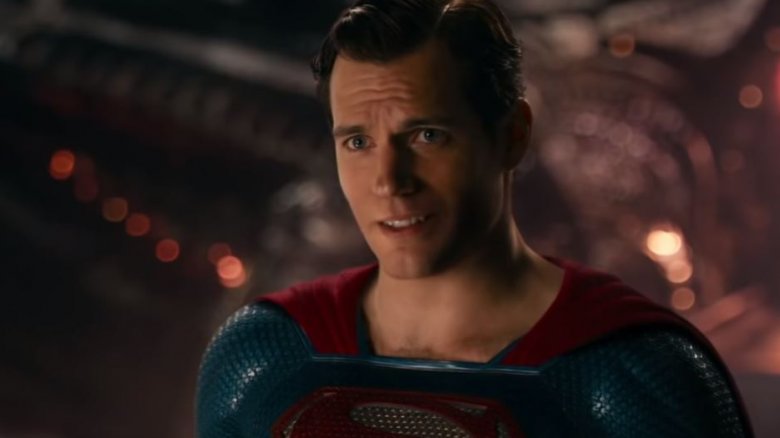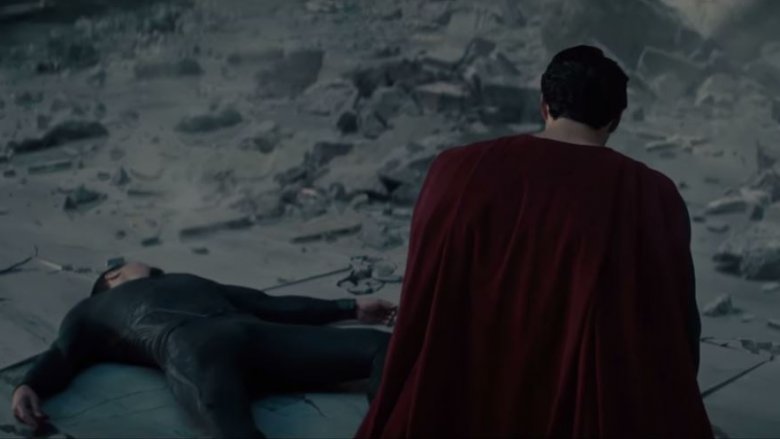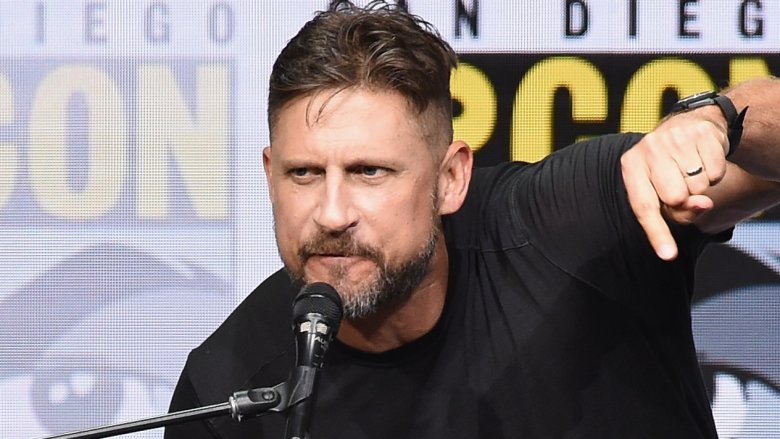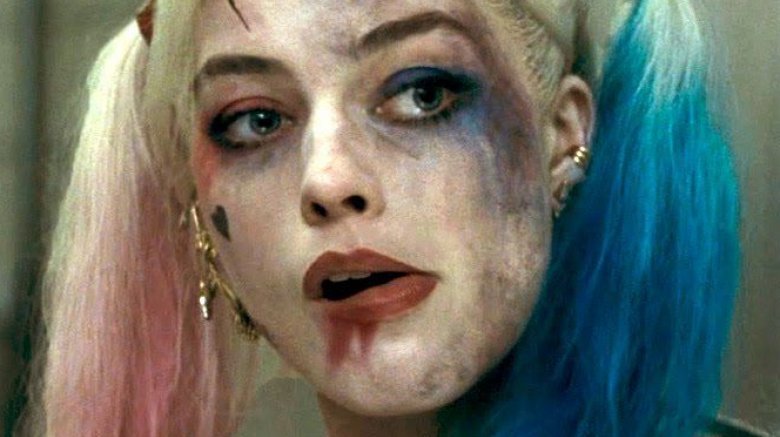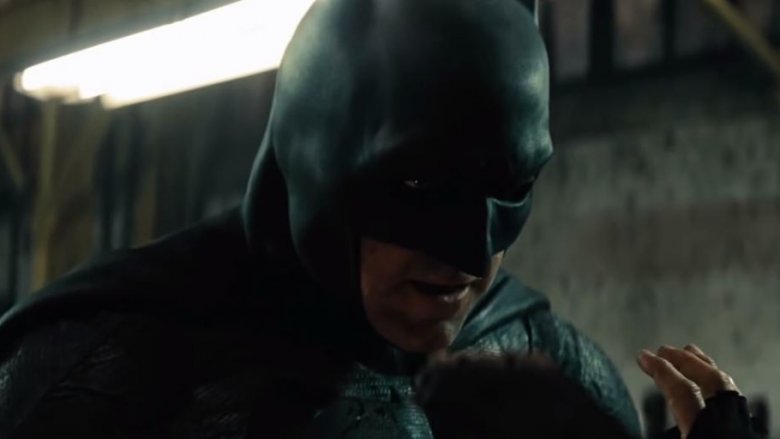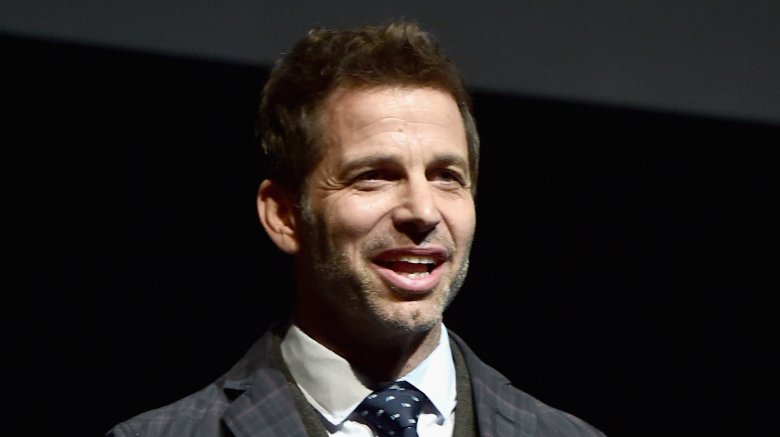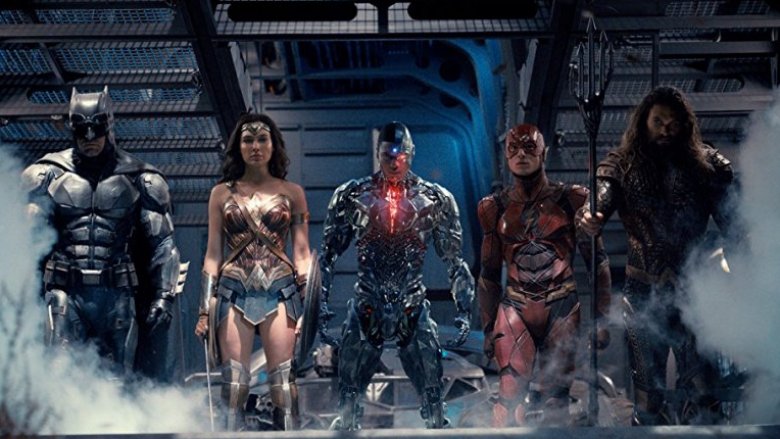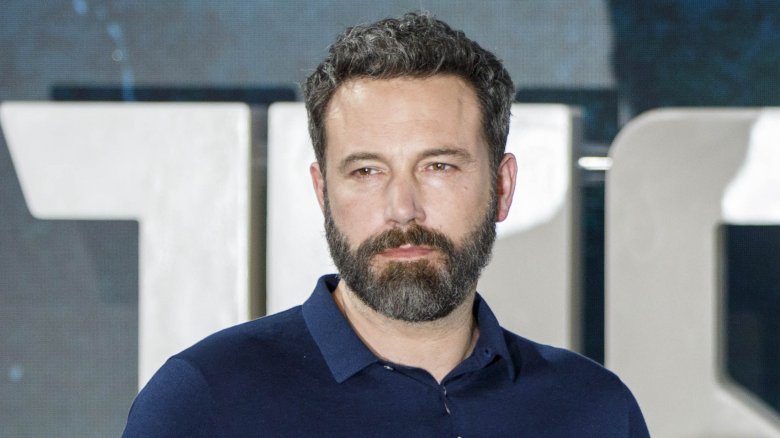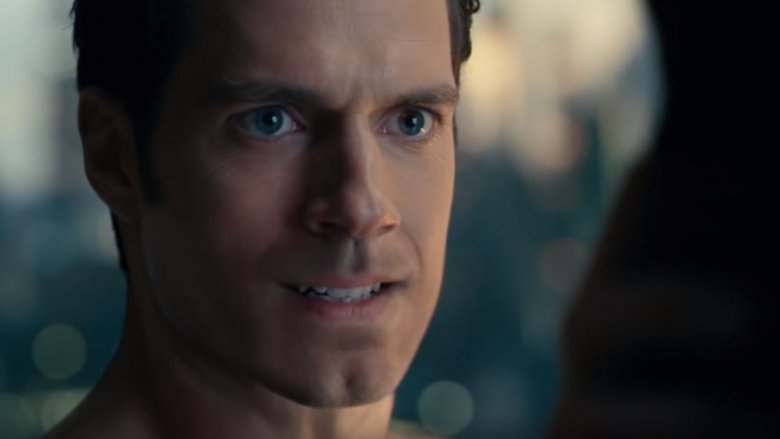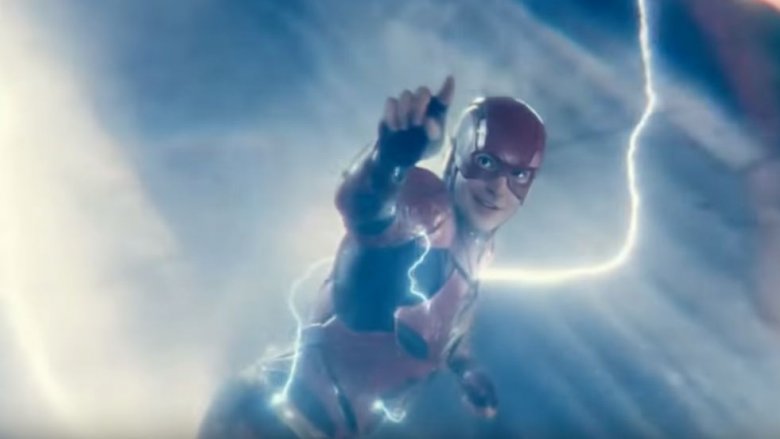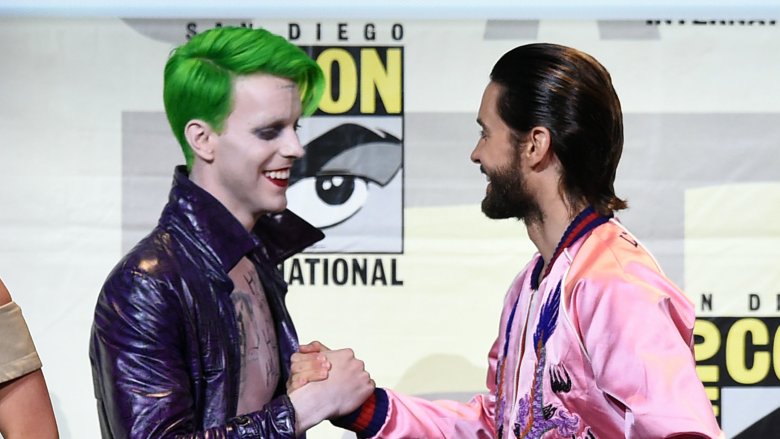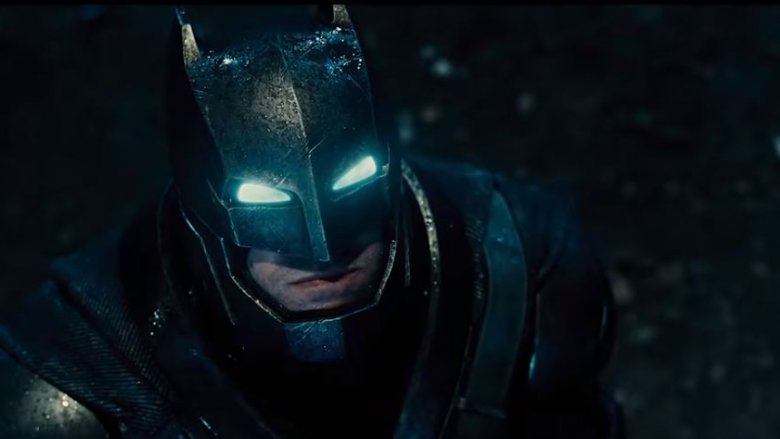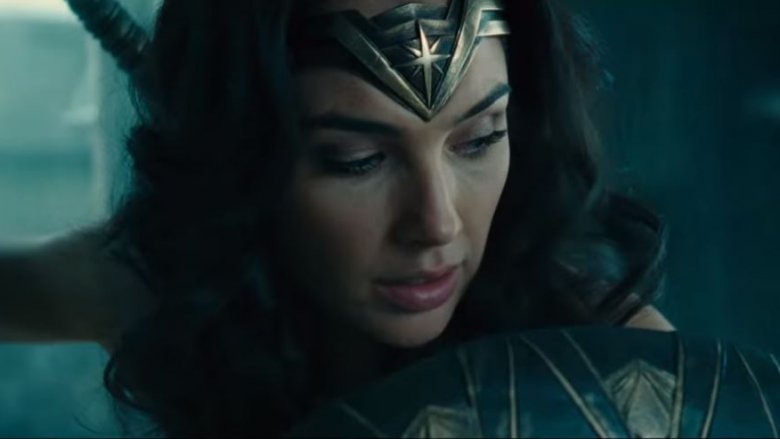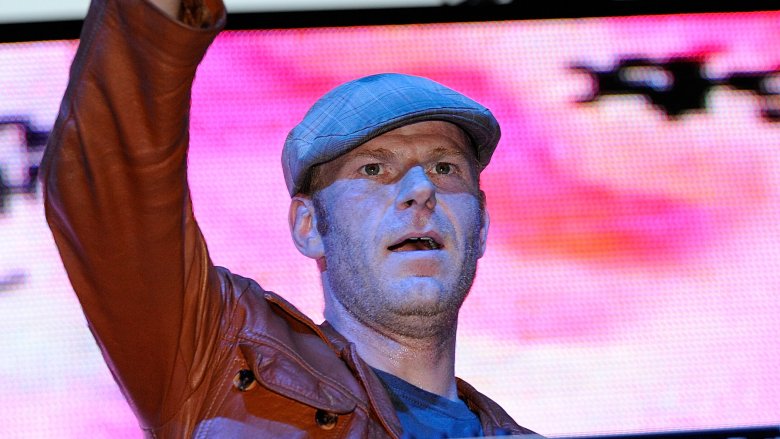The Biggest Scandals To Ever Hit The DCEU
Wonder Woman and Aquaman were relatively well received, you know, for being in the DC film universe. Overall, DC movies have had a rough decade. Back when Marvel Studios pioneered the crazy notion of turning multiple superhero movies into an interconnected universe, DC rushed to catch up ... and, yeah, you can see how that went. While the DCEU has certainly carved out some major hits, like that aforementioned Amazon demigoddess, the wide view hasn't been so hot.
Part of the problem is that Warner Bros., DC's parent company, jammed in heroes without establishing them first, like a kid doing no homework for months and then cramming for the exam. Arguably the bigger problem, though, is that the DCEU has been fraught with missteps, scandals, and controversies almost since its inception, leaving an angry fan base that only got angrier as time went on. These days, DC's movies are finally turning things around, but it took them a long time to get there. Here's why.
Oops, Superman's not such a boy scout
Coming hot on the heels of Christopher Nolan's Dark Knight trilogy, the 2013 Superman revival Man of Steel had its work cut out. Rather than repackaging the cheerful Superman audiences remembered from the '70s, Zack Snyder's Kal-El was presented as a decent man in a battered world where values like truth and justice weren't so easy to identify. These themes come to a head in the film's conclusion, where Superman is thrust into a no-win situation: To save an innocent family, he snaps the neck of his opponent, General Zod, the only other living Kryptonian. Ouch!
The internet went crazy. Fans were furious. "That's not Superman!" people shouted. Except, well ... it did happen in the comics.
As Forbes explains, Man of Steel's controversial scene was clearly inspired by a 1988 John Byrne comic, where Superman uses Kryptonite exposure (!) to murder three Kryptonian evildoers, Zod included. Harsh way to die, no? The comic book Kal-El has employed lethal force on many other occasions, as well, such as killing Doomsday. Looking at the film alone, though, there really wasn't much else that Superman could do in the situation presented: As argued by screenwriter David Goyer, Zod had vowed to exterminate the human race, and audiences would never expect a hero to spare such an unstoppable bad guy in any other alien invasion movie. Arguments aside, this "neck snap" moment was the DCEU's first big controversy, and later scandals would prove a lot more damaging.
The Suicide Squad director has nasty words for Marvel
As the two biggest comics publishers in town, Marvel and DC have always had a friendly rivalry with plenty of bantering. The key word here is "friendly" because whether they're making comics or directing blockbuster films, any true comics fan or creator wants both companies to succeed. On the other hand, there's Suicide Squad director David Ayer. According to Vanity Fair, Ayer first started slamming Marvel at a 2015 Comic Con event, saying DC had better villains. Okay, whatever, but he ramped up the hostility the following year, at the big world premiere of Suicide Squad, by shouting "F*ck Marvel!" to the attendees.
People weren't happy about this, though it probably didn't help that Suicide Squad ended up such a critical disaster. Mere hours later, Ayer apologized for "getting caught up in the moment," admitting that his outburst had been disrespectful to all the talented Marvel filmmakers out there.
Sexism gets called out
Suicide Squad was disappointing for many reasons, but particularly in its treatment of Harley Quinn. Though Margot Robbie is perfectly cast, Harley herself is constantly presented in a hyper-sexualized, mocking, objectified manner, and many found the depiction of her relationship with the Joker to be deeply troubling: as Daily Beast points out, the film seems like it wants to paint Harley as a clueless damsel waiting to be rescued by her loving (albeit evil) boyfriend, while underplaying just how monstrously abusive the Joker's actions are to her. While certain key Joker sequences were cut, according to Cinema Blend, the film that hit theaters left lots of viewers deeply uncomfortable. Honestly, the sheer fact that the movie's Joker/Harley dynamic spawned creepy "relationship goals" memes shows how badly the whole thing was presented.
The DCEU's female objectification issues didn't end there, unfortunately. After Wonder Woman earned acclaim for its unprecedented level of female representation in the genre, Diana's portrayal in Justice League — where the camera constantly leers at her from overtly sexualized angles — was a major setback, according to publications like ScreenCrush and SyFy. Moviegoers also criticized Justice League's treatment of Diana's fellow Amazons, according to PopBuzz, whose Greek-style war attire from Wonder Woman was ditched in favor of male-gazey leather bikinis.
Ben Affleck is cast as Batman
Hey, you've got to feel for Ben Affleck. A devoted comics fan, Affleck was unlucky enough to star in that not-so-great 2003 Daredevil flick, only to pivot, repair his reputation, sign on for an ultra-dark Batman portrayal ... and then get stuck in whatever the heck Justice League ended up being.
Affleck's time with the Dark Knight started rough and ended rougher. All the way back in 2013, the now-infamous Bat-Fleck casting began causing an uproar across the internet. According to Variety, it took less than a day for over 30 petitions to spring up on Change.org begging Warner Bros. to fire Affleck from the role. Poor guy. One White House petition even begged President Obama to make it illegal for Affleck to play Batman. A little extreme, no? Thankfully, the White House blocked that particular petition. In the end, Affleck truly gave the role his all, and when Batman v Superman: Dawn of Justice finally hit theaters, his gritty performance ended up being one of the few elements of the film that received widespread praise. Talk about a twist ending!
Zack Snyder calls it quits (or does he?)
The DCEU was largely Zack Snyder's brainchild. He conceived it, he launched it, and he had a master plan for how it was going to end. Whether his deconstructionist take on these classic heroes was your cup of tea or not, he was certainly ambitious — and dedicated.
That's what made it so shocking when, midway through production, he left Justice League. The biggest factor in his departure, according to the Hollywood Reporter, was the suicide of his 20-year-old daughter. Snyder said he had kept this information private for months, attempting to work through the pain, but finally decided he needed to leave the stress of movie production and focus on his family. That's genuinely understandable and respectable. However, Polygon reported a year later that this official narrative left out a key detail: Multiple sources have said that Snyder was actually fired by Warner Bros. months before his "voluntary" departure. Meanwhile, Justice League's lackluster reception has led to a fervent outcry for a mythical "Snyder cut" that may or may not exist, according to Screen Rant. A clearer story may emerge in the future, so ... stay tuned?
If you or anyone you know is having suicidal thoughts, please call the National Suicide Prevention Lifeline at 1-800-273-TALK (8255).
Justice League is rushed ... so execs can get their bonuses
Regardless of why Zack Snyder left Justice League, one thing is evident from the film itself: The whole production was a rushed mess. Between two directors with wildly different visions, reshoots, and inconsistent marching orders from higher-ups, Justice League is clearly a project that (at the very minimum) needed to bake a little longer. Clearly, Warner Bros. didn't believe in the movie. So why did they rush it forward instead of spending the time to get it right?
The answer, disappointingly enough, is all money. In October 2016, according to the Wrap, Warner Bros. was getting ready to merge with AT&T. Meanwhile, Justice League production had gone totally haywire, clearly needing to be delayed to the following year, but if that happened, the WB executives were concerned that their big bonuses would be delayed past the point of the AT&T merger. If they left the studio after the merger, no bonuses.
While another source did dispute this account, it's depressingly believable to imagine a few executives allowing a film about beloved characters to really suck, just to squeeze out a little extra money for themselves. But you know it's possible — you've probably seen Batman & Robin.
The great Batfleck flip-flopping
Ben Affleck was iffy about signing on as Batman, but what sold him on the role, according to Screen Rant, was Zack Snyder's vision: a multi-film saga that would've ended in Justice League 2 with Batman reversing the apocalypse by launching back in time, a la Wolverine in Days of Future Past, and sacrificing his life to save Lois Lane from being murdered by Darkseid. Basically, the reason Bruce Wayne was so screwed up in Batman v Superman: Dawn of Justice was that Snyder had a redemption plan in store. Affleck was really jazzed about this story, and he also agreed to cowrite, direct, and star in a one-off film titled The Batman.
Then, Dawn of Justice came out. Oops.
The so-called "Sad Affleck" meme was born, and with it came an endless back-and-forth over whether Affleck was going to ditch the DCEU, according to CBR. Whenever interviewers asked how The Batman was coming along, Affleck expressed increasing annoyance. Finally, he announced he wasn't going to direct anymore (according to MSN, he decided he "couldn't crack it"), and despite reprising his role for Suicide Squad and Justice League, it soon became clear that behind-the-scenes scuffles had sucked away his passion for the role. By February 2019, he confirmed via tweet that he had exited the DCEU, but he was still extremely respectful toward the solo Batman film that would now proceed without him.
Justache League
Great Krypton! You saw it. You recoiled at it. The worst uncanny valley effect in any superhero film ever, and it wasn't a big green monster or a robot, but rather, Henry Cavill's super-distorted upper lip. If there's any one image that most symbolizes how rushed Justice League was, it's Superman's face. The internet community roasted this bad CGI like there was no tomorrow, and it makes you wonder: How did this monstrosity ever occur?
It all comes down to the reshoots. After Cavill wrapped up Justice League for Warner Bros., he hopped over to the set of Paramount's new Mission: Impossible flick and grew a rather impressive bit of lip fuzz for his character in that film. But when WB decided to drastically reshoot huge chunks of Justice League (never a good sign), it put Cavill in a weird predicament: either he'd have to wear a fake stache for Mission: Impossible, get a CGI stache, or play a noticeably furrier Kal-El in Justice League. According to Polygon, Paramount estimated that digitally replacing Cavill's mustache would cost them $3 million, so they balked and pushed the burden onto Justice League's special effects artists. God knows why they decided to open the film with that thing.
In all honesty, though, why didn't WB just depict the resurrected Superman with a beard, and maybe even long hair? He's had facial hair in the comics before.
Flash is too fast for anyone to catch him
Ezra Miller's wide-eyed, humorous depiction of Barry Allen, aka the Flash, was widely considered one of the better parts of Justice League, but the character's race to a solo picture has hit roadblock after roadblock. As explained by Entertainment Weekly, an Ezra-led Flash movie was first announced in 2014 based on a treatment by Phil Lord and Chris Miller (the dynamic duo behind Spider-Man: Into the Spider-Verse). A year later, Seth Grahame-Smith was hired to direct, only to drop out less than a year later. No biggie: Dope director Rick Famuyiwa was hired on a few months later and started casting. Just when Flash seemed ready to move, Famuyiwa called it quits, and the script was rewritten to adapt "Flashpoint," the story arc in which Barry time-travels to save his mom and creates a worldwide mess. Big story for a first movie, no?
In 2018, John Francis Daley and Jonathan Goldstein were hired to direct, but in March 2019 sources told the Hollywood Reporter that the directing duo was having creative disputes with Ezra Miller, who had allegedly teamed with comics writer Grant Morrison to write his own script. Will the Scarlet Speedster ever make it to the finish line, alongside Aquaman, Wonder Woman, and Shazam? Keep your fingers crossed, but it's been a messy race.
Method acting taken too far
The Joker is the kind of role that can define an actor's career, and Heath Ledger set a high standard. So when Academy Award winner Jared Leto was cast in Suicide Squad, he followed Ledger's lead by applying a method acting approach to the role. However, while Ledger famously locked himself in a London hotel room and wrote a Joker diary, the reports of Leto's bizarre behavior on the Suicide Squad set caused a lot of negative online commentary. According to USA Today, some of the cast members reported that Leto had given them Jokerish presents such as a live rat, an adult magazine, a box of bullets, and ... a dead pig. Okay. MTV says he also "gifted" people what appeared to be used condoms, adult toys, and a switchblade, while staying in-character as the Joker at all times.
When asked about this, Leto initially said his intention was to create an element of spontaneity on the set in the spirit of the Joker character. More recently, according to Screen Rant, Leto has disputed many of these behind-the-scenes stories, arguing that the gift-giving pranks he did with fellow cast members were exaggerated to get press. True, false? Either way, they certainly made headlines.
Batman breaks his "one rule" (a lot)
Superman killing Zod was one thing, but Batman? Yikes. Unlike Supes, Batman's "no-killing" rule has been a huge part of the character for decades, even playing a key role in the Dark Knight trilogy. So when Zack Snyder's Batman started gunning people down, running them over, and spending a whole movie trying to murder Superman, fans weren't happy.
The flame wars died down when Justice League depicted Batman as a goofy puffball, but the killing controversy reignited in 2019, when Zack Snyder rose from the ashes to defend his vision, according to Vox, telling any fans who were unhappy about Batman's homicide count to "wake the f*ck up." You can probably guess how that landed. Snyder's full argument was a bit more complex than the headlines made it sound — he had intended to give his Batman a redemptive arc — but lifelong Bat-fans went from angry to furious. Comics creators like Gail Simone and Kevin Maguire also voiced their dismay, according to SyFy, arguing that a Batman who goes out at night and exterminates people really isn't a hero to root for.
Besides that, if Batman kills people then why is the Joker still alive?
Wonder Woman ejects Brett Ratner
Brett Ratner was a powerful guy. Known for directing the Rush Hour movies, Ratner's production company RatPac-Dune Entertainment had a deal with Warner Bros. to cofinance various big films, with one particular success being 2017's Wonder Woman. Later that year, though, the #MeToo movement brought Ratner's dark side into the light: allegations from multiple women, including major celebrities like Ellen Page and Olivia Munn, suggested a history of sexual harassment and assault. Soon, according to Page Six, rumors buzzed that Wonder Woman star Gal Gadot was springing into action. First, she backed out of a dinner where she was slated to present an award to Ratner, and then she reportedly said she would refuse to play the iconic Amazon warrior again unless WB ditched Ratner.
Warner Bros. did sever ties with Ratner in light of the allegations. According to Cinema Blend, however, Gadot says her own actions were only one piece of a larger puzzle, claiming that WB cut off Ratner before she could speak out. Maybe she's just being humble, but either way, Wonder Woman 1984 is Rat(ner)-free.
Junkie XL is ditched
If you loved all those early DCEU themes, like Wonder Woman's edgy battle song or the operatic Man of Steel theme, the two people you should thank are Hans Zimmer and Junkie XL (above). The latter composer — whose real name is Antonius Holkenborg — was originally carried over from Batman v Superman to Justice League. That suddenly changed in mid-2017, according to Bleeding Cool, when WB unexpectedly replaced him with Danny Elfman.
Now, Danny Elfman is one of the most legendary film composers of all-time — he's written themes for movies like Spider-Man, Tim Burton's Batman, and The Simpsons — but some felt his style was an awkward fit for Justice League. Instead of bringing back the Junkie/Zimmer compositions, Elfman revived the classic Superman and Batman themes from 1977 and 1989, which left many filmgoers feeling a weird disconnect between the modern screen characters and the old school music. Sure, in a movie full of production blunders, this one was relatively minor, but this one probably would have been easier to avoid.
